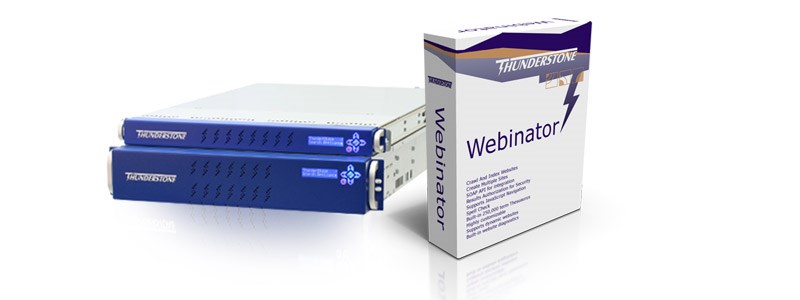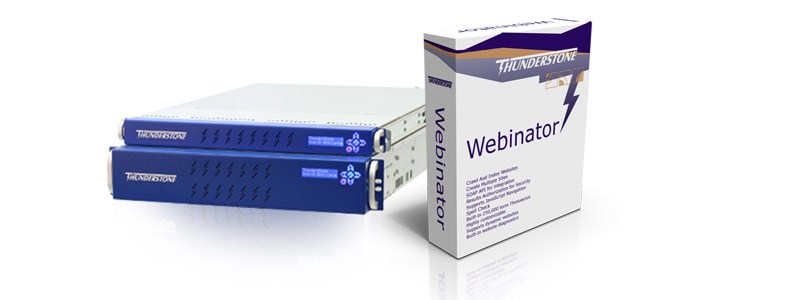Editors at Lincoln Library Press, Inc. created an online version of everything contained in the multi-volume hardback books their publishing company sells to school libraries. This new and popular web-based resource for students, called FactCite, would also offer much additional content not currently available within the printed editions. The creators of FactCite required powerful search technology that could handle the growing information access and retrieval needs of the FactCite.com website. After considering Google and a couple of other potential options, they started with a Thunderstone Search Appliance -- but they ultimately decided it made the most sense to have Thunderstone Data Services host their search solution.
FactCite: The Lincoln Library Online provides more than 20,000 pages of eye-catching, thought-provoking and intelligently presented factual information that includes many useful elements designed specifically to help students in grades 4 - 12 with their homework assignments.
The online articles, bios, photos, illustrations, etc., include 700+ reader-inspiring profiles of the world's greatest athletes (from all eight editions of the 14-volume set entitled The Lincoln Library of Sports Champions,) the complete five-volume contents of The Lincoln Library of Greek & Roman Mythology, as well as the entire seven-volume set of The Lincoln Library Shapers of Society and The United States Encyclopedia of History -- an impressive (but, alas, no longer in print) work which The Lincoln Library Press bought, took over, updated, computerized and put online exclusively at FactCite.
Located in Cleveland, Ohio, The Lincoln Library Press markets its large, colorful books and the FactCite online resource directly to school librarians throughout the United States. Schools that own at least one of the printed and bound sets (Sports Champions, 8th Edition; Greek & Roman Mythology; or Shapers of Society) can obtain unlimited access to FactCite for an annual license fee of $179 per building. Schools that don't own any of the print editions may provide unlimited FactCite access to their students by paying an annual license fee of $495 per building.
The Lincoln Library Press is an imprint of Lincoln Library Press, Inc., which Timothy and Susan Gall have owned and operated since 1992. This husband-wife team already possessed more than 20 years of hands-on experience as reference work developers by the time that their company's editorial offices assumed stewardship of all The Lincoln Library publications in 1998. They first met each other while employed at Northeast Ohio-based ASM International, the Materials Information Society. Timothy, an attorney, worked there as an acquisition editor. He also developed a product called Metal Selector, an online database of alloys and materials, to assist engineers in selecting materials for design purposes. Susan, a teacher by training who additionally earned an MBA, worked at ASM International on the educational end of things -- developing technical courses and producing learning programs in video and print formats.
Putting All Their Best-Available Content on the Web, and Making it Searchable
As the forward-looking owners of all The Lincoln Library publications decided to update, expand, digitize and put their proprietary intellectual property on the web and to offer it to schools as FactCite -- they required search technology that could handle the growing data access and retrieval needs of the FactCite.com website.
Tim Gall, publisher at The Lincoln Library Press, recalled, "We needed search capabilities, and there were a lot of different types of ways to do that. The Thunderstone box was the least expensive, most powerful search solution we found. We looked at Google and a couple of others.
"But there were also some challenges for a small company like us. If you got the Thunderstone Search Appliance box, you physically had to host it here -- which we didn't necessarily want to do, because that means you need a little bit more internal infrastructure. You have to manage your servers. You have to make sure they're up and running. You can try to send it out to other hosted server providers, but that's easier said than done. They say things like, 'You'd have to have your own cabinet. You'd have to hire your own administrator, and on and on.'
"We were working with a web hosting provider that cost us a lot of money because they didn't know how to interface with the search box. They told us we needed a new server. They said Thunderstone wasn't following some protocol. They started talking gobbledygook. And they were wrong. They just didn't spend the time to understand how to get things right. So, they had egg on their face.
"We bought the box. It was here in our office. It doesn't really need much configuration. When we got it, I hired a guy who was a little smarter than me. I think he had that search box up and running inside half an hour. We set it up and just forgot about it. It ran perfectly, right away.
"More recently we've been building our online subscription service to supplement the print products with a large amount of information that's not published in books, that's just available electronically. And we're, little by little, putting that on the web, because -- obviously -- it's all going to end up there anyway eventually. Then, somebody at Thunderstone said: 'I tell you what; we'll host it on a virtual server.' And for me, right now, I can't even tell the difference between whether it's on a box or on the hosted service. It's got the same control panel. I open it up, it works great, and I don't have to worry about it."
Tapping Thunderstone Data Services For Consulting And Hosted Search
The Thunderstone Search Appliance is a plug-and-play device that represents the best search solution for many businesses, NGOs, educational institutions and government agencies around the world. It comes with a one-time, perpetual license and powerful features usually found in much more expensive products.
Some organizations, however, prefer a remotely-hosted, outsourced search solution that requires no additional hardware/software on their premises. Or they may need custom programming not suitable for the built-out Appliance environment.
With Thunderstone Data Services, including monthly hosting and any applicable project consulting or programming work, customers can get precisely what they want -- while enjoying a surprisingly affordable total cost of ownership on their Thunderstone-hosted search solution.
For the sake of maintaining the proprietary nature of the FactCite online subscription service, it would prove critical to develop appropriate security measures. Thunderstone created a Texis-based search application with access control capabilities that fully accommodated the desired user login procedures specified by The Lincoln Library Press.
Gall related, "I was flabbergasted that it hadn't been canned by hardly anyone. You can't find this type of login software very easily out there. I mean, I looked all over. I wanted a simple program -- just a little database to keep track of users, give them a password, etc. I figured, how hard can that be? Someone's canned that. I had quotes from tens of thousands of dollars and up. Or, in many cases, they couldn't even do it at all.
"Thunderstone quickly and easily wrote that customized login capability for us. It's gone very smoothly, and we found it pleasant working with them. No complaints.
"Maybe a school will have eight or ten different computers, and they don't want to have to bother with a separate password and login for each one. It's too much to manage. So, we can use the same password, etc. for computers within a specified IP range. We also give the librarians a user name and password that the kids can use to log in after school hours -- when they're at home."
Combining the Advantages of Printed Books with Online Enhancements
Educational book reviewers have favorably noted that while The Lincoln Library's multi-volume sets are easy to read and grasp for younger students just beginning to learn about the people and topics covered, the well-researched articles also manage to offer much subject matter that eleventh or twelfth graders will find informative and descriptive enough to help them when they write their term papers.
FactCite: The Lincoln Library Online retains the attractive content formatting and the many homework-friendly characteristics that make The Lincoln Library editions popular with students. Users can access everything, complete with all full-color and black-and-white scanned elements, plus the actual source text as it appears in the printed books. Or they can enter a query in the search box -- and it will return relevant results.
FactCite provides both educators and pupils with:
- Thousands of images
- Advanced search features
- Drill-down menus for easy searching
- Multiple indexes
- Regularly-updated content
Teachers encourage students to employ FactCite when working on their homework assignments, although they typically remind the kids to properly credit the website in their reference notes and bibliographies.
"We tried to design it from the kids' point of view. Often you go to a site, you type in the keyword, and you get 5,000 hits. And Wikipedia, for example, is not really ideal for kids in school. It's too difficult to read. There's too much information there, and it's not a narrative story. It's sometimes overwhelming.
"The articles at FactCite are written specifically to be useful to our target audience. There's material you can print out for inclusion in your reports. You can print out graphics and images, even outlined images that can be colored in. You won't find excessive links (they're mostly at the end of articles) and certainly none that take you away from the site.
"The challenge is, at certain grade levels, to get kids to read. It's very hard to teach a kid to read on the computer. There are too many distractions. There are too many hot links. You're moving all over, and you lose sight of what you're doing.
"We've brought into our books [and FactCite] large-text introductions that are written at a level that almost any kid could read. And then we have lots of pictures and text boxes to spur their interest, as well as to keep them engaged.
"In terms of using Thunderstone's search technology, we're certainly just scratching the surface currently. But, we know the things we want to do with it in the future." Gall explained.
Enriching FactCite.com with The Lincoln Library of Essential Information
FactCite continues to add fresh, new articles dealing with the fundamentals of Geography, World History, Science and other key areas that will cross-cut most of the curriculum for grades 4 through 12. This growing quantity of robust and enhanced content comes from a rigorously updated version of The Lincoln Library of Essential Information.
According to Gall, the book began in 1907 as The Standard Dictionary of Facts -- a one-volume compilation of all sorts of information, and by 1924 it had turned into The Lincoln Library of Essential Information. At that time there was a big push in America for self education. People were trying to teach themselves all sorts of things. And this book was organized to serve that purpose. Instead of being organized as a standard encyclopedia, things were organized by subject categories. Therefore, students could go through and read about a subject. At the end of the articles there were test questions. Readers, in the privacy of their own homes, could test themselves on the knowledge they acquired by going through the articles.
"It evolved into a two-volume set, and by then it had kind of retreated into the library and out of the home. It still retained its autodidact features. If you wanted to learn a subject area, you could go into it and in six or seven pages you got a pretty good grasp of what it's all about. You'd see which sources to go to for further reading, books you should be looking for, what you really should be reading if you want to have some clue about what's going on. There were always incredibly good authors writing for it, people from the best universities."
"So, we took this set and we scanned it and computerized it. It had never been computerized. And we started sending out the articles for revision. Perhaps about 60 percent are back already. We're moving now to put that material online at FactCite.
"We're going to lead with it on the website first. Rather than making print the primary product and electronic the secondary product, we're now going to flip that -- with electronic as the primary and print as the secondary product," said Gall.
Gall estimated that comparable online products from marketplace competitors would probably cost schools $4,000 to $5,000. The Lincoln Library Press, even as it steadily expands its total knowledge repository in the months ahead, will deliver a much better-priced alternative. And, unlike others, FactCite won't offer 50,000 articles about the 'Internet.' Instead, it will have one or two highly useful articles that kids can and will actually read.



 call Peter Thusat at +1 216 820 2200 ext. 118.
call Peter Thusat at +1 216 820 2200 ext. 118.




